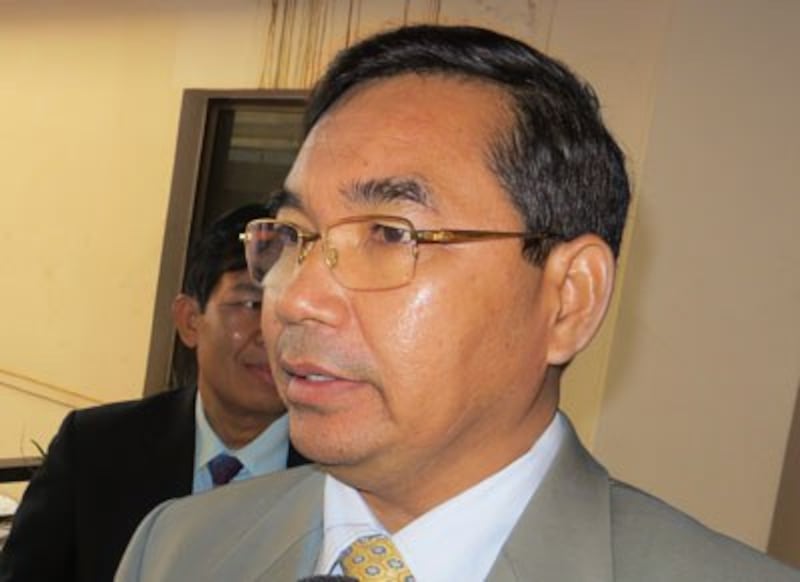Nine nongovernmental organizations on Wednesday slammed Cambodia’s ruling and opposition parties for considering measures that would ban them from giving interviews or making statements deemed “insulting” to political parties during election periods, saying the restrictions would violate free speech.
During recent negotiations on electoral reform, Deputy Prime Minister Bin Chhin of the ruling Cambodian People’s Party (CPP), and Kuoy Bunroeun of the opposition Cambodia National Rescue Party (CNRP), reportedly stated that the measures were being considered to ensure the neutrality of NGOs.
In a joint statement, the NGOs—including local rights groups and media watchdogs—said the restrictions would go against the Cambodian constitution and binding international treaties to which Cambodia is a party, such as the International Covenant on Civil and Political Rights (ICCPR), which guarantees the right to freedom of expression.
“Whilst the right to freedom of expression is not absolute, restrictions can only be introduced where absolutely necessary to serve a legitimate aim, whereas a ban on giving media interviews appears intended to shield the government and members of political parties from criticism, rather than meeting any pressing social need,” the statement said.
“Vaguely worded provisions providing penalties for ‘insulting’ political parties or candidates would leave considerable room for broad interpretation by the authorities to justify crackdowns on dissenting voices,” it said.
In response to the statement, Kuoy Bunroeun told RFA’s Khmer Service that the two parties had finished chapter eight of the new election law on Monday, but had not yet discussed neutrality and independence of the country’s NGOs.
“In the draft law, we allow independent and impartial NGOs to monitor the election campaign,” he said.
“We will also discuss a code of conduct for the NGOs, however, the CNRP has not agreed on anything yet.”
Bin Chhin told RFA that the NGOs can express their views, but cannot insult politicians or political parties.
“They must remain independent and impartial,” he said.
“They can analyze [the political situation], but they can’t insult.”
NGO concerns

In their statement, the NGOs noted that the Human Rights Committee, which implements the ICCPR, has affirmed that “the mere fact that forms of expression are considered to be insulting to a public figure is not sufficient to justify the imposition of penalties.”
The groups also referred to the committee’s conditions that “all public figures, including those exercising the highest political authority such as heads of state and government, are legitimately subject to criticism and political opposition.”
The committee will be reviewing Cambodia’s fulfilment of its obligations under the ICCPR next month.
According to Wednesday’s statement, the measures proposed by the political parties “would only serve to stifle public debate, impair citizens’ constitutional right to participate actively in the political life of the nation, and undermine civil society’s legitimate role in holding public authorities to account.”
The groups noted that the comments about the measures were made amid “on-going impunity” for the killing of demonstrators by the security forces in January last year, as well as “politically motivated arrests, unfair trials and harsh sentencing of activists and members of the opposition.”
“Rather than introducing further restrictions on freedom of expression, we urge the government and leaders of all political parties to work together to end impunity, strengthen the independence of the judiciary, and amend other legislation that also threatens to place undue restrictions on the activities of civil society organizations,” the statement said.
Control of security forces
Also on Wednesday, New York-based Human Rights Watch hit out at the CPP for enhancing its political control over Cambodia’s security forces by adding at least 80 commanders and other officials with security duties to the party’s central committee on Feb. 1.
Human Rights Watch Asia director Brad Adams said in a statement that when security force personnel move from ordinary party membership to a party leadership role “they are crossing the line.”
“Cambodia won’t have impartial, rights-respecting security forces so long as their commanders are beholden to the ruling party,” he said.
The CPP’s Extraordinary Nationwide Representative Congress on Sunday dropped 29 persons from its existing 268-person Central Committee, but added 306 new names, including “virtually every important national, regional, and provincial officer and official with command authority over security forces,” Human Rights Watch said.
The move more than tripled the number of persons on the committee with operational control over Cambodia’s security forces, it said, while also adding all of the country’s provincial and municipal governors.
Human Rights Watch expressed concern that many of the new members of the Central Committee have also been implicated in serious human rights abuses, while many of the units for which the new members are responsible “have long histories of violating human rights.”
“Holding a senior post in Cambodia’s ruling party has proven to be a handy way for human rights abusers to escape justice,” Adams said.
“Lower level police officers, prosecutors, and judges are afraid enough of the security forces, but now they also have to worry about retaliation from the CPP if they do their jobs.”
Threat of lawsuit
Phnom Penh City Hall spokesman Long Dimanche said if Human Rights Watch’s statement contained allegations of rights abuses against officials without proper evidence, City Hall would consider suing the group.
He added that appointing Phnom Penh’s governor, police chief and military police chief to the CPP’s Central Committee would not affect their impartiality.
“I don’t think having positions inside the party will affect their impartiality—they are complying with their duties according to the law,” he said.
“When they perform their duties, they don’t fix them to the party’s affairs. For example, when I work as a public official to provide people with security, I work according to my duty. We members [of the CPP] have differentiated between public work and party affairs.”
Reported by RFA’s Khmer Service. Translated by Samean Yun. Written in English by Joshua Lipes.
